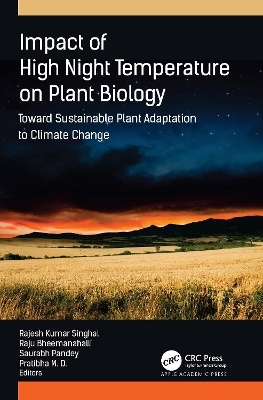
Impact of High Night Temperature on Plant Biology
Apple Academic Press Inc. (Verlag)
978-1-77491-733-6 (ISBN)
- Lieferbar (Termin unbekannt)
- Versandkostenfrei
- Auch auf Rechnung
- Artikel merken
The persistence of higher night-time temperatures (HNT) over long periods during the crop cycle can potentially impact a wide range of growth and developmental stages. The major processes drastically affected by night-time warming, such as photosynthesis, respiration, etc., ultimately cause yield and economic losses. Despite this, HNT has not been significantly researched regarding its impact on plants. This new book provides a comprehensive understanding of the physiology of night-time warming, trait responses, advanced tools for phenotyping, and alleviation and mitigation strategies.
Rajesh Kumar Singhal, PhD, is a Scientist in the Division of Crop Improvement of the ICAR-Indian Grassland and Fodder Research Institute, Jhansi (U.P), India. He has published research and review papers and book chapters as well as an MCQ book, A Quick Approach to Plant Physiology, Biochemistry and Biotechnology. Raju Bheemanahalli, PhD, is an Assistant Research Professor of Plant and Soil Sciences at Mississippi State University, USA. He leads multidisciplinary research on how crops respond to stressors (drought, heat, cold, nutrients, and others) at different growth stages. His work has resulted in improved basic and applied knowledge of monocot and dicot crops in response to stressors and management. Affiliated with several journals, he has published peer-reviewed journal articles. Saurabh Pandey, PhD, is an Assistant Professor of Agriculture at Guru Nanak Dev University, Amritsar, Punjab, India. He is currently working on biotic stress management of unconventional crops, like banana and apple, in the Punjab region for screening and analysis of banana germplasms for banana bunchy top virus (BBTV) tolerance and establishing screening methods and biomarkers for microbiological resources toward improved crop phosphorus (P) uptake under highly P-deficient soils. Pratibha M. D., PhD, is a Scientist in the Division of Basic Sciences at the ICAR-Indian Institute of Horticultural Research, Bengaluru, Karnataka, India. Currently, she is working on identifying molecular mechanisms conferring combinatorial stress tolerance in brinjal (eggplant). She has also worked at Monsanto Holding Pvt. Ltd. as a vegetable backcross breeder, contributing to the development of more than 15 hybrids in tomato and hot pepper.
Introduction PART I: NIGHT-TIME WARMING: AN INTRODUCTION 1. Natural and Anthropogenic Factors Responsible for Night-Time Warming 2. Elevated CO2 and Night Warming for Plant Growth and Development 3. Plant Growth and Development Under High Night Temperatures PART II: NIGHT WARMING EFFECT ON CRUCIAL PROCESSES AND METABOLISM 4. Night Warming Responses on Crucial Plant Processes and Growth Stages: An Overview 5. Effect of Elevated Night Temperature on Nutrient Cycle, Nutrient Uptake, and Transport 6. Effect of Elevated Night Temperature on Metabolism (Respiration) 7. High-Temperature Stress: Effects on Plant Metabolism Specific to Lipidome PART III: REPRODUCTIVE GROWTH AND NIGHT WARMING 8. Effect of Night-Time Warming on Reproductive Growth of Plants 9. Effect of Night-Time Warming on Yield and Quality Attributes PART IV: PLANT GROWTH REGULATORS AND OMICS UNDER NIGHT WARMING 10. The Role of Plant Growth Regulators in Combating High Night Temperature Stress 11. Omics Under Elevated Night Temperature
| Erscheinungsdatum | 10.10.2024 |
|---|---|
| Zusatzinfo | 12 Line drawings, color; 8 Line drawings, black and white; 12 Illustrations, color; 8 Illustrations, black and white |
| Verlagsort | Oakville |
| Sprache | englisch |
| Maße | 152 x 229 mm |
| Themenwelt | Naturwissenschaften ► Biologie ► Botanik |
| Weitere Fachgebiete ► Land- / Forstwirtschaft / Fischerei | |
| ISBN-10 | 1-77491-733-5 / 1774917335 |
| ISBN-13 | 978-1-77491-733-6 / 9781774917336 |
| Zustand | Neuware |
| Informationen gemäß Produktsicherheitsverordnung (GPSR) | |
| Haben Sie eine Frage zum Produkt? |
aus dem Bereich


